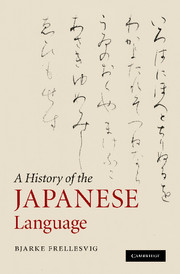Book contents
- Frontmatter
- Contents
- List of tables, maps and figures
- Acknowledgements
- List of abbreviations
- Introduction
- Part I Old Japanese
- 1 Early writing in Japan and Old Japanese sources
- 2 Phonology
- 3 Grammar
- 4 Loanwords
- 5 Eastern Old Japanese
- Part II Early Middle Japanese
- Part III Late Middle Japanese
- Part IV Modern Japanese
- Appendix: Summary of the main regular phonemic changes between Old Japanese and conservative Modern Japanese
- References
- Index of main grammatical forms
- General index
5 - Eastern Old Japanese
Published online by Cambridge University Press: 03 May 2011
- Frontmatter
- Contents
- List of tables, maps and figures
- Acknowledgements
- List of abbreviations
- Introduction
- Part I Old Japanese
- 1 Early writing in Japan and Old Japanese sources
- 2 Phonology
- 3 Grammar
- 4 Loanwords
- 5 Eastern Old Japanese
- Part II Early Middle Japanese
- Part III Late Middle Japanese
- Part IV Modern Japanese
- Appendix: Summary of the main regular phonemic changes between Old Japanese and conservative Modern Japanese
- References
- Index of main grammatical forms
- General index
Summary
The language of the overwhelming majority of OJ sources is that of the capital Nara, or the area around it. However, some sources reflect dialects from eastern Japan, usually collectively referred to as Eastern Old Japanese. Volume 14 of the Man'yōshū consists of 230 azuma uta ‘eastern songs/poems’, out of which 89 have the place of origin identified in the commentary. Most of these were recorded by people from the capital travelling to the east in various official capacities. Volume 20 includes 93 sakimori uta ‘borderguard songs’, composed by soldiers from the east, mostly serving on guard duty in Kyushu, again mostly recorded by scribes from the capital area. Finally, the Hitachi fudoki includes 9 songs in EOJ. This material does not reflect a single dialect, but at least three main areas which may be labelled: (a) northern EOJ, comprising poems from (or dialects spoken in) the provinces of Kazusa, Mutsu, and Shimotsuke; (b) central EOJ: Hitachi, Kōzuke, Musashi, Sagami and Shimōsa; and (c) southern EOJ: Shinano, Suruga, and Tōtōmi. These dialect areas differ appreciably between each other, with southern being least and northern most different from the central OJ dialect of the capital area. However, the majority of the poems and songs which are identified as EOJ have no information about their provenance.
- Type
- Chapter
- Information
- A History of the Japanese Language , pp. 151 - 154Publisher: Cambridge University PressPrint publication year: 2010



